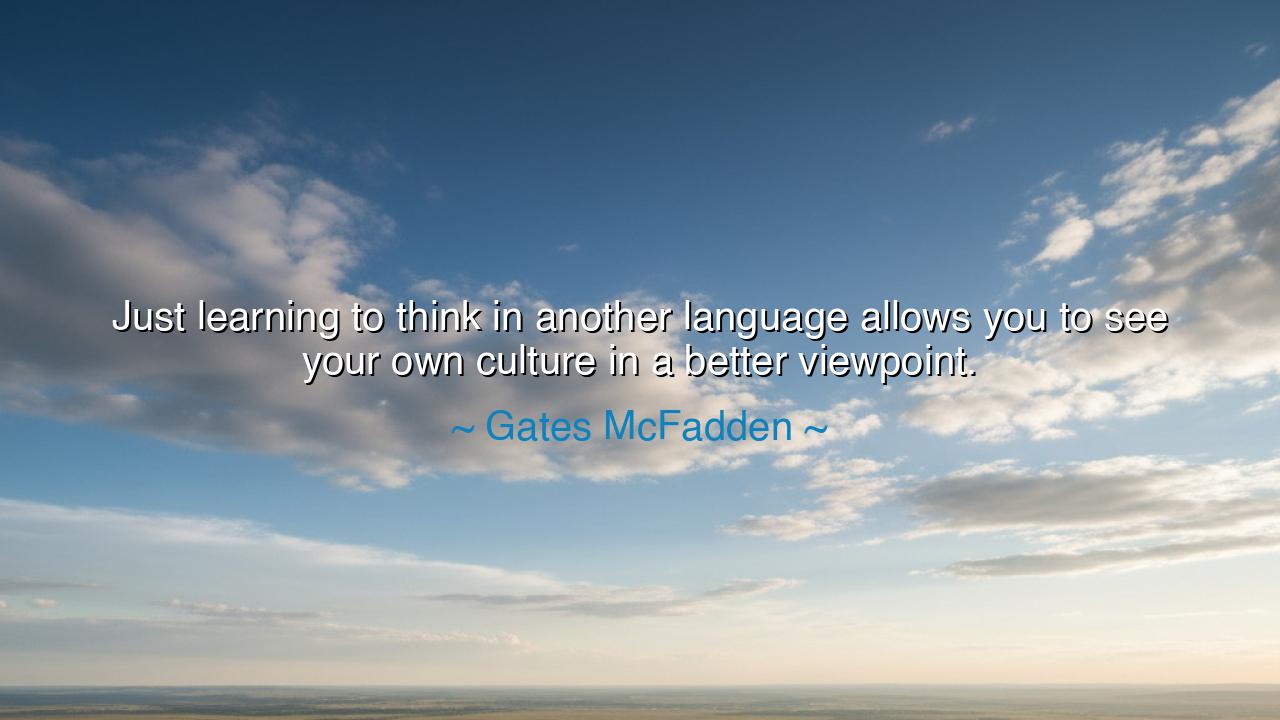
Just learning to think in another language allows you to see your
Just learning to think in another language allows you to see your own culture in a better viewpoint.






In the old houses of wisdom, the elders said: “To borrow another tongue is to borrow another pair of eyes.” So when Gates McFadden declares that “just learning to think in another language allows you to see your own culture in a better viewpoint,” she names a quiet alchemy. A new grammar rearranges the furniture of the mind; fresh sounds loosen old certainties; unfamiliar words carve new paths through familiar hills. What we thought was the only way of naming time, kinship, duty, humor—suddenly it is one way among many, and our own culture comes into focus not as absolute, but as chosen, crafted, beloved.
To think in another language is more than translating words; it is adopting the rhythm of someone else’s weather. Articles and genders, tones and honorifics, plurals and cases—each is a small philosophy wearing the mask of grammar. Some tongues have twenty ways to say “we” and tell you, before you speak, who is included; others demand you mark respect or intimacy with every verb. These are not quirks; they are lenses. Through them, home looks different: we notice our courtesy where it is strong, our impatience where it is brittle, our jokes where they are cruel or kind. In this way, the foreign mirror gives us a better viewpoint for judging our own face.
Consider Nelson Mandela on Robben Island, deciding to learn Afrikaans—the language of his jailers. He did not do it to surrender, but to understand. As he studied their proverbs and cadences, he gained keys to their fears and hopes, and with those keys, he unlocked negotiations that once seemed impossible. A language became a bridge; across it walked empathy, strategy, and eventually a nation’s rebirth. The lesson is not that words alone free the captive, but that learning another tongue can free the mind to see adversaries as humans and history as negotiable.
The ancients knew this too. Medieval scholars who read Aristotle in Arabic discovered that ideas travel better than armies. Japanese rangaku students, learning Dutch in the Edo period, imported not only instruments but methods—careful observation, experiment, and annotation—that later helped Japan modernize without abandoning its soul. In each case, another language served as a toolkit and a lantern: one for doing, one for seeing. It let people measure their own culture against a different sky and keep what was noble while mending what was narrow.
This insight humbles pride and heals shame. Pride softens because we see that our ways are local, not universal. Shame softens because we realize every culture is unfinished—each solves some human problems brilliantly and leaves others for neighbors to teach us. To think beyond one’s mother tongue is to stand on a ridge between valleys and praise both: the lullabies that formed us, and the new songs that show us where our lullabies were silent.
From this, take a clear lesson: fluency is a gift, but even beginner’s learning changes the angle of light. A handful of phrases, a poem understood without a dictionary, a joke caught in real time—each is a small door opening onto a wider room. The goal is not to become someone else, but to return home with keener eyes: to see how our own culture handles love, conflict, time, and truth—and to choose, more consciously, what to keep and what to grow.
Let counsel become practice. Pick one language and court it daily: five new words before breakfast. Keep a tiny lexicon of untranslatables—terms that name what your first tongue forgot. Read parallel texts; copy a stanza by hand until its logic enters your breath. Seek conversation with elders and newcomers who carry other grammars inside them; ask for their proverbs. Try translating a family story into your new words; notice what changes when you must choose different metaphors. Do these things, and you will find what McFadden promises: thinking in another language will give you a better viewpoint—not to abandon your home, but to see it truly, cherish it wisely, and amend it bravely.






AAdministratorAdministrator
Welcome, honored guests. Please leave a comment, we will respond soon